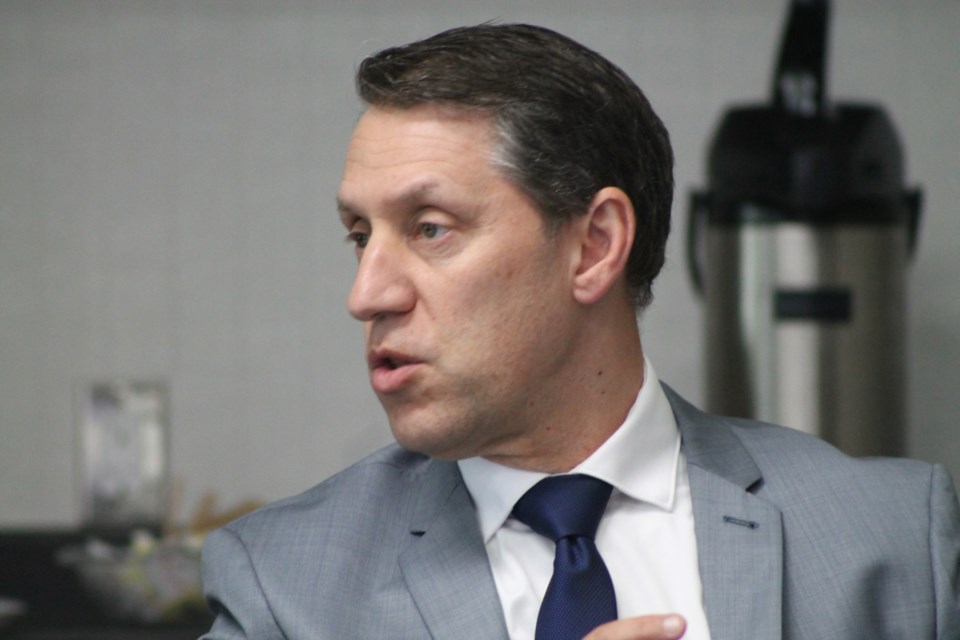Sault College will be suspending several programs in the fall of 2025 due to a declining number of international students at its Northern Avenue campus.
And more program suspensions may be on the way.
"I can’t say to you for sure today that we will have additional suspensions, but there is a possibility that we will have additional suspensions. There are still some variables around enrolment,” said David Orazietti, Sault College president, to reporters after Thursday’s board of governors meeting.
The federal government's international student cap, announced in January, and reductions in post graduation work permits for international students have led to a lower number of international student numbers at Sault College and made those programs no longer worth the cost to deliver.
Sault College - along with the rest of the post-secondary education sector in Canada - has relied heavily on international students in recent years.
Six-hundred and seventy-one out of 680 students enrolled in the programs marked for suspension by Sault College on Thursday are international students.
Students currently enrolled in the affected programs will be allowed to continue their studies until they graduate.
The board voted at its Thursday meeting to suspend:
- Advanced Project Management – Strategic Leadership
- Project Management
- Construction Project Management
- Global Business Management
- Gerontology
- Climate Change Mitigation
- Environmental Sustainability Analysis
Each of the suspended programs is either one-year or two-year graduate certificate programs.
Professional Nursing Practice for International Nurses - Acute Care is also suspended as it is moving from a one-year program to a two-year graduate certificate program.
Approximately 30 part-time and sessional instructors will be affected by the program suspensions, Orazietti said.
No full-time faculty members will be affected.
The college had already announced in July that 18 other programs were suspended for fall of 2024 or fall of 2025.
“We’re seeing a very clear slowdown in international student uptake,” Orazietti said.
Sault College currently has approximately 900 international students and is expecting a smaller intake in the winter, summer and fall semesters.
“We might be in the 400 to 500 international student range for next fall. We are going to be impacted by this very significantly. The question is by how many students and how soon. It’s starting to happen now. The trend is happening now. We see from our international recruiting partners a lack of interest, a slowdown in applications and a lot of concern around the uncertainty in the Canadian post-secondary sector about whether a program is work permit-eligible or not,” Orazietti said.
Signs point to a Sault College with much lower international student enrolment, lower revenue and a need to attract more domestic students.
“We are adapting as best we can. The federal government, I think it’s clear, is not going to change course at this point. The sector is in the process of adjusting. We're continuing to make the necessary adjustments in our program mix in terms of becoming a leaner organization and with fewer students on campus, focusing on domestic enrolment,” Orazietti said.
Along with the first round of program suspensions announced in July, Sault College introduced a hiring freeze and a salary freeze to address its $5.7 million deficit heading into the 2024-25 academic year and beyond.
The deficit stems from a reduction in the number of international students who will be attending Sault College and its private partner college - TriOS College - in Brampton.
Current enrollment at TriOS is 2,307.
“The college has been looking at every area possible to save money, from slowing down capital projects to temporarily suspending equipment purchases to budgetary reductions in travel, cell phones. All areas of operation and all expenditures in each department’s budget are continuing to be scrutinized for ways in which we can reduce costs,” Orazietti said.
Orazietti stated that the college will have a better picture of its financial state when it prepares its next fiscal year’s budget in early 2025 and that the institution is still actively promoting programs that line up with current labour market needs.
